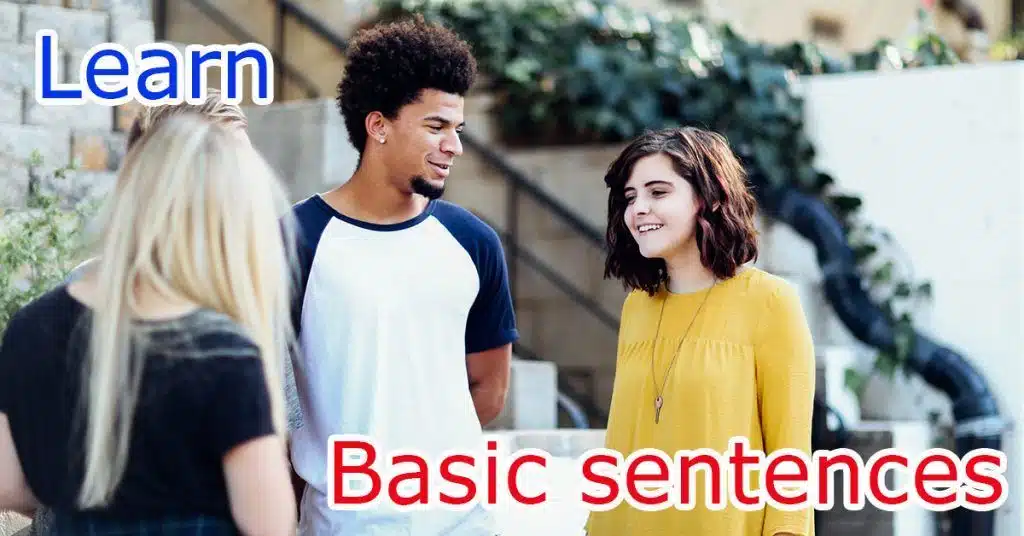Learn 100 common and useful verbs in French
When learning a new language like French, mastering verbs is crucial. Verbs are the backbone of communication, allowing you to express actions, thoughts, preferences, and more.
Understanding verbs helps you form sentences and articulate yourself in everyday situations. Once you know the pronouns and some key verbs, you’ll be able to create simple sentences, such as:
Je comprends – I understand
Je dors – I sleep
Je mange – I eat
Je lis – I read
Elle court – She runs
Il parle – He talks
Vous partez – You go
Ils reviennent – They come back
As demonstrated, just a pronoun and a verb can help you communicate effectively.
To accelerate your learning and make it more efficient, focusing on the most common and useful French verbs is essential.
Below, you’ll find example sentences for 100 common and useful French verbs, organized alphabetically. This list will aid you in practicing and improving your French at any time and anywhere.
Need a French tutor, click here, and get $10 USD italki credits with a $20 purchase, credited to your student wallet within 48 hours.
1)Practical Example Sentences for 100 Common French Verbs
- Acheter – to buy
J’aime acheter des livres. = I like to buy books.
- Agir – to act
Il faut agir vite. = We need to act fast.
- Aimer – to like/to love
Elle aime les fleurs. = She likes flowers.
Julien aime Marie. = Julien loves Marie.
- Ajouter – to add
N’oublie pas d’ajouter du sel. = Don’t forget to add salt.
- Aller – to go
Nous allons au cinéma ce soir. = We’re going to the movies tonight.
- Apercevoir – to see/to spot
J’ai aperçu un chat dans le jardin. = I spotted a cat in the garden.
- Apprendre – to learn
Je veux apprendre à jouer du piano. = I want to learn to play the piano.
- Arriver – to arrive
Ils arrivent bientôt à la gare. = They soon arrive at the station.
- Avoir – to have
J’ai un chat. = I have a cat.
- Boire – to drink
Je bois du café le matin. = I drink coffee in the morning.
- Cacher – to hide
Il aime cacher des trésors. = He likes to hide treasures.
- Changer – to change
Nous devons changer nos plans. = We need to change our plans.
- Chanter – to sing
Elle chante très bien. = She sings very well.
- Chercher – to look for
Je cherche mes clés. = I’m looking for my keys.
- Comprendre – to understand
Je ne comprends pas cette règle. = I don’t understand this rule.
- Compter – to count
Il sait compter jusqu’à dix. = He can count to ten.
- Conduire – to drive
Elle va conduire jusqu’à la ville. = She’s going to drive to the city.
- Connaître – to know
Je connais bien cette forêt. = I know this forest very well.
- Continuer – to continue
Il continue à travailler malgré la fatigue. = He continues to work despite the tiredness.
- Courir – to run
Nous aimons courir le matin. = We like to run in the morning.
- Crier – to shout
Il crie très fort. = He shouts very loudly.
- Croire – to believe
Elle croit en ses rêves. = She believes in her dreams.
- Défaire – to undo
Je vais défaire ce nœud. = I’m going to undo this knot.
- Demander – to ask
Elle demande des conseils. = She asks for advice.
- Descendre – to come down
Nous devons descendre les escaliers. = We need to come down the stairs.
- Devenir – to become
Elle veut devenir médecin. = She wants to become a doctor.
- Dire – to say/to tell
Il dit toujours la vérité. = He always tells the truth.
- Donner – to give
Je vais lui donner un cadeau. = I’m going to give him/her a gift.
- Dormir – to sleep
Je dors bien la nuit. = I sleep well at night.
- Écouter – to listen to
Elle écoute de la musique. = She listens to music.
- Entendre – to hear
J’entends un bruit étrange. = I hear a strange noise.
- Envoyer – to send
Elle va envoyer une lettre. = She’s going to send a letter.
- Essayer – to try
Tu devrais essayer ce nouveau plat. = You should try this new dish.
- Être – to be
Nous sommes amis depuis longtemps. = We have been friends for a long time.
- Étudier – to study
Je dois étudier pour mon examen. = I need to study for my exam.
- Exister – to exist
Des solutions existent toujours. = Solutions always exist.
- Faire – to do/make
Nous devons faire nos devoirs. = We need to do our homework.
J’ai fait ce mur. = I made this wall.
- Faire du shopping – to go shopping (for leisure)
Elle aime faire du shopping le weekend. = She likes to go shopping on weekends.
- Faire les courses – to go shopping (for groceries)
Nous devons faire les courses ce soir. = We need to go grocery shopping tonight.
- Finir – to finish
J’ai fini mon travail. = I finished my work.
- Frapper – to hit
Il ne faut jamais frapper quelqu’un. = You should never hit someone.
- Garder – to keep
Elle garde tous ses souvenirs. = She keeps all her memories.
- Jeter – to throw
Je vais jeter ces vieux vêtements. = I’m going to throw away these old clothes.
- Jouer – to play
Ils aiment jouer au football. = They like to play football.
- Lire – to read
Elle aime lire des romans. = She likes to read novels.
- Manger – to eat
Nous devons manger plus de légumes. = We should eat more vegetables.
- Mettre – to put/to place
Je vais mettre mes chaussures. = I’m going to put on my shoes.
- Obtenir – to get
J’ai enfin obtenu mon diplôme. = I finally got my diploma.
- Occuper – to occupy
Le travail l’occupe beaucoup. = Work occupies him/her a lot.
- Offrir – to offer
Il va lui offrir un cadeau. = He’s going to offer her a gift.
- Oublier – to forget
Je ne veux pas oublier cette journée. = I don’t want to forget this day.
- Parler – to speak
Elle parle couramment trois langues. = She speaks three languages fluently.
- Passer – to pass
Je vais passer devant chez toi. = I’m going to pass by your place.
- Payer- to pay
Je vais payer l’addition. = I’m going to pay the bill.
- Penser – to think
Il pense toujours à elle. = He always thinks about her.
- Peser – to weigh
Ce sac pèse très lourd. = This bag weighs a lot.
- Pleurer – to cry
Ne pleure pas, tout va bien. = Don’t cry, everything is okay.
- Poser – to put
Il va poser le livre sur la table. = He’s going to put the book on the table.
- Pousser – to push
Il faut pousser la porte pour entrer. = You need to push the door to enter.
- Pouvoir – to be able to/can
Tu peux le faire, j’en suis sûr. = You can do it, I’m sure of it.
- Prendre – to take
Je vais prendre un café, s’il vous plaît. = I’ll take a coffee, please.
- Présenter – to present
Elle va présenter son projet demain. = She’s going to present her project tomorrow.
- Quitter – to leave
Il doit quitter la maison tôt le matin. = He has to leave the house early in the morning.
- Rappeler – to call back
Je vais te rappeler plus tard. = I’ll call you back later.
- Recevoir – to receive
Elle va recevoir un prix pour son travail. = She will receive an award for her work.
- Reconnaître – to recognize
Je ne peux pas reconnaître son visage. = I can’t recognize his/her face.
- Redire – to repeat/to say again
Tu dois redire ce que tu as dit. = You have to repeat what you said.
- Refaire – to redo
Nous devons refaire cette peinture. = We need to redo this painting.
- Regarder – to look
Il aime regarder les étoiles la nuit. = He likes to look at the stars at night.
- Remettre – to put back
Il va remettre les livres à leur place. = He’s going to put the books back in their place.
- Rencontrer – to meet
Je vais rencontrer mon ami cet après-midi. = I’m going to meet my friend this afternoon.
- Rendre – to return
Il doit rendre ce livre à la bibliothèque. = He has to return this book to the library.
- Répéter – to repeat
Je vais répéter ce que j’ai dit. = I’m going to repeat what I said.
- Répondre – to answer
Elle va répondre à tes questions. = She will answer your questions.
- Rester – to stay
Nous allons rester ici pour la nuit. = We’re going to stay here for the night.
- Retourner – to return
Je vais retourner à la maison maintenant. = I’m going to return home now.
- Retrouver – to find
Il a finalement retrouvé ses clés. = He finally found his keys.
- Revenir – to come back
Il va revenir demain matin. = He will come back tomorrow morning.
- Rire – to laugh
Nous avons ri pendant des heures. = We laughed for hours.
- Saigner – to bleed
Saigner du nez peut être effrayant. = Bleeding from the nose can be scary.
- Saisir – to seize
Il doit saisir cette opportunité. = He must seize this opportunity.
- Sauver – to save
Les pompiers ont réussi à sauver le chat. = The firefighters managed to save the cat.
- Savoir – to know
Il sait jouer de la guitare. = He knows how to play the guitar.
- Se sentir – to feel/ to feel something
Elle se sent malade aujourd’hui. = She feels sick today.
- Secourir – to rescue
Les sauveteurs ont réussi à secourir les naufragés. = The rescuers managed to rescue the stranded crew.
- Sembler – to seem
Ça semble difficile à comprendre. = It seems difficult to understand.
- Sentir – to feel/to smell
Je sens une bonne odeur de gâteau. = I smell a delicious cake.
- Servir – to serve
On va servir le repas maintenant. = We will serve the meal now.
- Suivre – to follow
Vous devez suivre ces instructions. = You need to follow these instructions.
- Tirer – to pull, to shoot
Il tire la corde pour ouvrir le rideau. = He pulls the cord to open the curtain.
- Tourner – to turn
Tournez à gauche au prochain carrefour. = Turn left at the next intersection.
- Travailler – to work
Nous travaillons dur pour atteindre nos objectifs. = We work hard to achieve our goals.
- Trouver – to find
J’ai trouvé mon téléphone sous le lit. = I found my phone under the bed.
- Tuer – to kill
Il ne faut jamais tuer personne. = You should never kill anyone.
- Vendre – to sell
Elle va vendre ses vieux vêtements au marché. = She’s going to sell her old clothes at the market.
- Venir – to come
Ils vont venir à la fête demain. = They’re going to come to the party tomorrow.
- Vivre – to live
Ils vivent dans une petite maison près de la rivière. = They live in a small house near the river.
- Voir – to see
Je vais voir ce film ce soir. = I’m going to see that movie tonight.
- Voler – to steal/ to fly
Il ne faut jamais voler quoi que ce soit. = You should never steal anything.
Les oiseaux volent dans le ciel. = The birds fly in the sky.
- Vomir – to vomit
Elle va vomir si elle mange trop. = She will vomit if she eats too much.
- Vouloir – to want
Je veux une glace. = I want an ice cream.
2) List of common and useful verbs in French in alphabetic order: [download pdf version]
- acheter – to buy
- agir– to act
- aimer – to like/to love
- ajouter – to add
- aller – to go
- apercevoir – to see/to spot
- apprendre – to learn
- arriver – to arrive
- avoir – to have
- boire – to drink
- cacher – to hide
- changer – to change
- chanter – to sing
- chercher – to look for
- comprendre – to understand
- compter – to count
- conduire – to drive
- connaitre – to know
- continuer – to continue
- courir – to run
- crier – to shout
- croire – to believe
- défaire – to undo
- demander – to ask
- descendre – to come down
- devenir – to become
- dire – to say/to tell
- donner – to give
- dormir – to sleep
- écouter – to listen to
- entendre – to hear
- envoyer –to send
- essayer – to try
- être – to be
- étudier – to study
- exister – to exist
- faire – to do
- faire du shopping – to go shopping (for leisure)
- faire les courses – to go shopping (for groceries)
- finir – to finish
- frapper – to hit
- garder – to keep
- jeter – to throw
- jouer – to play
- lire – to read
- manger – to eat
- mettre – to put/to place
- obtenir – to get
- occuper – to occupy
- offrir – to offer
- oublier – to forget
- parler – to speak
- passer – to pass
- payer– to pay
- penser – to think
- peser – to weigh
- pleurer – to cry
- poser – to put
- pousser – to push
- pouvoir – to be able to
- prendre – to take
- présenter – to present
- quitter – to leave
- rappeler – to call back
- recevoir – to receive
- reconnaitre – to recognize
- redire – to repeat/to say again
- refaire – to redo
- regarder – to look
- remettre – to put back
- rencontrer – to meet
- rendre – to return
- répéter – to repeat
- répondre – to answer
- rester – to stay
- retourner – to return
- retrouver – to find
- revenir – to come back
- rire – to laugh
- saigner – to bleed
- saisir – to cease
- sauver – to save
- savoir – to know
- se sentir – to feel/ to feel something
- secourir – to rescue
- sembler – to seem
- sentir – to feel/to smell
- servir – to serve
- suivre – to follow
- tirer – to pull, to shoot
- tourner – to turn
- travailler – to work
- trouver – to find
- tuer – to kill
- vendre– to sell
- venir – to come
- vivre – to live
- voir – to see
- voler – to steal/ to fly
- vomir – to vomit
- vouloir – to want
I hope this list of verbs was useful for you, you can also watch it in video if you prefer, with different example sentences. If you have any questions, please leave a comment.



